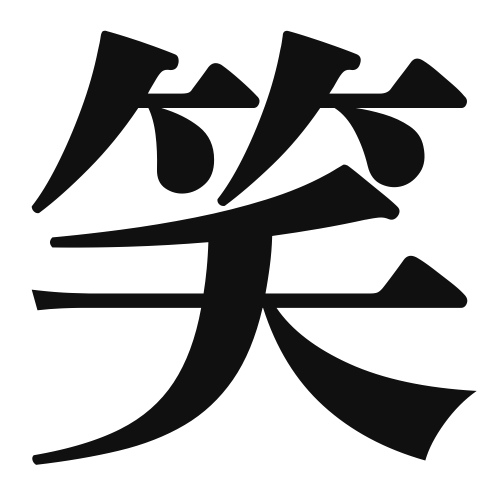1. Overview of Meaning
The kanji “笑” (pronounced “wara” or “shou”) means “to laugh” or “to smile.” It represents joy and happiness, often associated with positive emotions and social interactions.
2. Formation and Radicals
The kanji “笑” is a compound character that combines the radical for “to speak” (言) and the character for “to be” (少). This combination suggests the idea of expressing joy through speech.
The radical of “笑” is 言 (gen), which relates to words and speech, emphasizing the connection between laughter and communication.
3. Examples of Usage
Common words and phrases that include “笑” are:
- 笑顔 (えがお, egao) – “smiling face”
- 笑い (わらい, warai) – “laughter”
- 笑う (わらう, warau) – “to laugh”
Example sentences in daily conversation:
- 彼はいつも笑顔でいる。 (かれはいつもえがおでいる。) – “He is always smiling.”
- そのジョークは私を笑わせた。 (そのじょーくはわたしをわらわせた。) – “That joke made me laugh.”
4. Synonyms and Antonyms
Similar kanji with related meanings include:
- 喜 (き, ki) – “joy” or “delight,” which emphasizes a deeper sense of happiness.
- 楽し (たのし, tanoshi) – “to enjoy,” which focuses on the experience of joy rather than the expression of it.
Antonyms include:
- 泣 (なき, naki) – “to cry,” which represents sadness and the opposite of laughter.
5. Cultural and Historical Background
The kanji “笑” is deeply rooted in Japanese culture, where laughter is often seen as a way to build relationships and ease tensions. It is commonly used in various contexts, from casual conversations to formal settings.
Proverbs and idiomatic expressions that include “笑” are:
- 笑う門には福来る (わらうかどにはふくきたる) – “Good fortune comes to a laughing home,” suggesting that a positive attitude attracts happiness.
